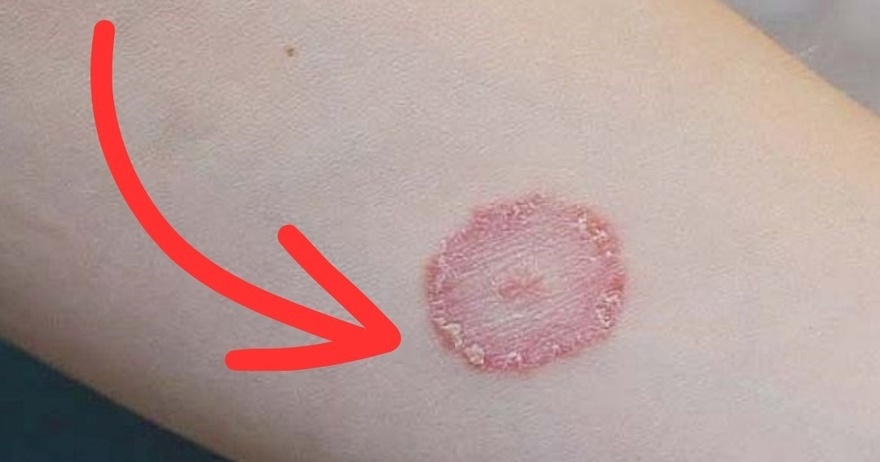Have you ever noticed round, red, itchy patches on your skin that seem to spread and grow? You might be dealing with a common fungal infection called ringworm, also known as tinea. Despite the name, ringworm isn’t caused by a worm—it’s a skin infection triggered by fungi called dermatophytes. These fungi love warm, moist environments and can spread through contact with infected individuals, pets, or even contaminated surfaces. Although ringworm is not usually dangerous, it’s highly contagious and can persist if not treated properly. Let’s dive into what causes ringworm, how to recognize it, and the best ways to treat it.
What is Ringworm?
Ringworm, or tinea corporis, is a fungal infection that appears as red, circular patches on the skin. It is most common during the summer months when the weather is warm and humid. The fungi responsible for this infection are dermatophytes, specifically three strains: Epidermophyton, Microsporum, and Trichophyton. These fungi feed on keratin, a protein found in the skin, hair, and nails.
Although anyone can get ringworm, it’s especially prevalent in children, young adults, and people who spend a lot of time in warm, moist environments. Understanding the symptoms and treatment options is essential to prevent the infection from spreading to others.
Recognizing Ringworm Symptoms
Identifying ringworm can be relatively straightforward, but it’s sometimes confused with other skin conditions like eczema or psoriasis. Here are the most common signs of ringworm:
Red, circular patches: These patches often have a clear center, giving them a distinct ring-like appearance.
Raised edges: The outer edges of the infected area may be slightly elevated and more inflamed than the center, which may appear normal.
Itching: The infected skin can become quite itchy, especially in hot or sweaty conditions.
Scaling and flaking: As the infection progresses, the affected skin may develop scales or flakes.
Spreading patches: Without treatment, ringworm can spread to other parts of the body, and multiple patches may join together to form larger, irregular shapes.
Ringworm commonly appears in areas of the body that tend to be warm and moist, such as the groin, underarms, and folds of the skin. While the infection is not typically harmful, it can cause significant discomfort and needs prompt treatment to avoid complications.
What Causes Ringworm?
Ringworm is caused by dermatophyte fungi, which feed on keratin found in the outer layer of the skin. The infection can spread in several ways:
Human-to-human contact: Touching an infected person or sharing items like towels, clothing, or bedding can easily transmit the fungi.
Animal-to-human contact: Pets such as cats, dogs, and even livestock like cows can carry the fungi and pass it to humans.
Environmental sources: Dermatophytes can survive in the soil for long periods, and direct contact with contaminated soil can lead to infection.
Factors that increase the risk of ringworm include poor personal hygiene, living in a humid climate, and having a weakened immune system. Maintaining clean and dry skin can significantly reduce the likelihood of infection.
How is Ringworm Diagnosed?
While ringworm symptoms are usually easy to identify, it’s important to confirm the diagnosis to rule out other skin conditions. Here are some common methods doctors use:
Visual examination: A healthcare provider can often diagnose ringworm just by looking at the affected area.
Wood’s lamp: This ultraviolet light test is sometimes used to identify fungal infections that glow under UV light.
Skin scraping and KOH test: A small sample of skin can be examined under a microscope after being treated with potassium hydroxide (KOH) to confirm the presence of fungi.
Fungal culture: In some cases, a sample is sent to a lab to determine the exact strain of fungus.
Treatment Options for Ringworm
Treating ringworm effectively requires antifungal medication, which can be either topical or oral, depending on the severity of the infection.
Topical Antifungal Creams
For mild cases of ringworm, over-the-counter creams are often sufficient. Popular options include:
Clotrimazole: This cream should be applied twice daily to stop the fungi from spreading.
Terbinafine: Known for its effectiveness, this cream can clear the infection in one to two weeks.
Miconazole: Another antifungal option that works well when applied regularly.
Oral Antifungal Medications
In more severe or widespread infections, oral antifungal medications may be necessary. Commonly prescribed drugs include:
Fluconazole: This medication is taken once a week and works to kill the fungus from the inside out.
Itraconazole: Often used for more extensive infections, but requires monitoring for potential side effects.
Griseofulvin: This traditional treatment is often used for scalp infections but must be taken over a longer period.
Natural Remedies
While not a substitute for medication, some natural remedies may provide relief:
Tea tree oil: Known for its antifungal properties, this oil can be applied after being diluted.
Coconut oil: Its mild antifungal properties can soothe itching and promote healing.
Apple cider vinegar: Applied in diluted form, it may help with minor infections.
Preventing Ringworm Recurrence
To prevent ringworm from coming back, it’s essential to practice good hygiene and make some lifestyle changes:
Keep your skin clean and dry.
Avoid sharing personal items like towels and clothing.
Bathe your pets regularly, as they can carry the fungus.
Wear loose-fitting, breathable clothing to minimize sweating.
Conclusion: Stay Informed and Take Action
Ringworm may be common, but with the right treatment and precautions, it can be managed effectively. By understanding the causes, recognizing the symptoms, and following a treatment plan, you can prevent the infection from spreading. Whether through medication or natural remedies, taking care of ringworm promptly will protect your health and the well-being of those around you.






























